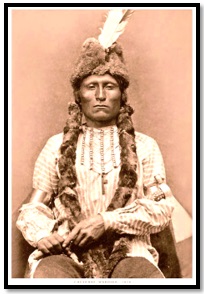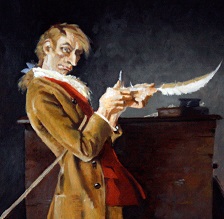 I’ve been trying to follow up on a previous post about the “divorce industry” in Oklahoma Territory (1889 – 1907), but I keep getting sidetracked by odd search results and unexpectedly engaging-but-off-topic tangents. I’m finally admitting that my ADHD (Abstemiously Distracted History Dysfunction) has won, and figure I might as well share some of the results.
I’ve been trying to follow up on a previous post about the “divorce industry” in Oklahoma Territory (1889 – 1907), but I keep getting sidetracked by odd search results and unexpectedly engaging-but-off-topic tangents. I’m finally admitting that my ADHD (Abstemiously Distracted History Dysfunction) has won, and figure I might as well share some of the results.
KANSAS CITY, Mo., Oct. 24.—Last June Judge Field, of the circuit court, granted a divorce to Ira Welch from his wife Ida on the ground of infidelity. Mrs. Welch had not received notice of the suit and the only evidence introduced was the affidavits of Welch and others. Mrs. Welch now brings suit to have the divorce set aside on the ground that she did not receive notice and that publication was not properly made.
OK, so first off – Ira and Ida Welch? How adorable is that!
It sounds like a fairly typical midwestern divorce case so far. It’s not clear how Mr. Welch ended up in Kansas City, but clearly Mrs. Welch hadn’t come with him. While the Midwest was known for its generally lax divorce laws during this period, I’m not aware of Kansas City being particularly notorious in that regard. Whatever the reason, after legal requirements had been met – probably the posting of newspaper notices giving Mrs. Welch a window of time in which to show up and make her case – the court had granted Mr. Welch a divorce.
Now the ex has found out and shown up. She’s in “not so fast, buster” mode – understandable, if inconvenient for Mr. Welch. But this one’s about to get weird, even for a contested midwestern divorce.
She admits criminal intimacy with T.R. Burch, general western manager of the Phoenix insurance company with whom she lived for two years at the Palmer house in Chicago.
“Criminal intimacy” presumably refers to adultery, although it’s certainly a far more colorful term. And it’s not like they just got drunk at an office party and had a moment of passion on the couch – she lived with him for two years! That certainly suggests things with Mr. Welch weren’t going well. What to do, what to do?
She admits also that she purchased a foundling after the Eva Hamilton method and attempted to palm it off on Burch as their child for the purpose of black mail and the attempt failed.
 A “foundling” was an unattached child – an orphan, or possibly a kidnapped baby or a child sold off for whatever reason. Apparently you could pick up a kid or three for next-to-nothing in those years. As to the “Eva Hamilton” reference, Hamilton was part of a wild, dysfunctional tale of sex, lies, and stabbing the nanny which unfolded in the press only months before. She, too, had tried the “but I gave birth to your child!” angle using faux offspring she’d only recently purchased, and was at the time of this report sitting in prison ostensibly for murder, but more honestly for being a bit of a ho.
A “foundling” was an unattached child – an orphan, or possibly a kidnapped baby or a child sold off for whatever reason. Apparently you could pick up a kid or three for next-to-nothing in those years. As to the “Eva Hamilton” reference, Hamilton was part of a wild, dysfunctional tale of sex, lies, and stabbing the nanny which unfolded in the press only months before. She, too, had tried the “but I gave birth to your child!” angle using faux offspring she’d only recently purchased, and was at the time of this report sitting in prison ostensibly for murder, but more honestly for being a bit of a ho.
Back to the tawdry Mrs. Welch:
She also admits criminal intimacy with Isaac Warrell, a capitalist of Chicago and several other prominent Chicago men.
Well sure – why not at that point?
So how, exactly, did she explain her opposition to this divorce?
She alleges, however, that her husband had full knowledge of her intimacy with all these men and that her immoralities were practiced with his consent, he receiving the greater part of the money that she extorted from her gentlemen acquaintances.
The case goes to trial tomorrow.
“Another Eva Hamilton” (Oklahoma City Daily Times, October 25, 1889)
Oh, well then – if her husband knew and approved, that’s a great reason to stay together.
Mr. Welch was granted his divorce.
As I returned to searching for “divorce mill” anecdotes, this story popped up:
TOLAGA, Oklahoma, Sept. 22.—Yellow Bonnet, a Cheyenne Indian, has applied for a blanket divorce from his four wives. It is the first time that an Indian has applied for a divorce in Oklahoma. Yellow Bonnett recently embraced the Christian religion, but his wives refused to become Christians.
The New York Times (September 23, 1895)
 My first inclination was to question the term “blanket” divorce, given the slang and mindset towards Amerindians at the time. Pretty sure I was reading too much into the term, however.
My first inclination was to question the term “blanket” divorce, given the slang and mindset towards Amerindians at the time. Pretty sure I was reading too much into the term, however.
Still, I couldn’t help but follow up. Apparently his wives had reached some sort of agreement amongst themselves that he had to divorce all or none of them. The fear was that if he divorced them individually, he’d get down to one last wife and decide to keep her, thus leaving the others cut off.
So they locked arms and insisted on all or nothing. Good for them.
And… “Yellow Bonnet”? Really?
Next result…
OKLAHOMA DIVORCE TANGLE
Mrs. Harris Sues Mason After He Is Reconciled with His Wife.GUTHRIE, Oklahoma, Dec. 3.—A very sensational case closed in the Probate Court at Newkirk to-day. Some time ago George M. Mason, a jeweler well known in several Colorado cities, came ot Oklahoma City from Denver to try to get a divorce.
Ah, that’s more like it. This is Oklahoma’s “Divorce Industry” in action!
Soon after his arrival he began to lavish attention on Mrs. Anna Harris, a dashing widow, boarding house keeper. Recently Mrs. Mason arrived from Colorado, effected a reconciliation, and the couple prepared to start for the Centennial State.
See, Colorado joined the Union in 1876, the nation’s centennial. What made this timing particularly interesting was—
Actually, never mind. BECAUSE I’M FOCUSED NOW.
The widow first attempted suicide.
Whoah, there – suicide? Not to downplay her suffering, but that’s the go-to response when your man-toy reconciles with his old lady? I mean, yell, sure. Curse, throw stuff at him – but suicide?
The doctors pumped out her stomach, and she had Mason arrested for stealing $150. She claimed to have left it with him for safe keeping.
Did he have the audacity to even come and step to her and ask to hold some money from her until he got his check next week?
That trifling, good-for-nothing type of brother. Silly widow – why didn’t she find another?
The evidence developed that she had received the money from a well-known merchant, and had given it to Mason with the understanding that in return he was to pay attention to her alone. The Judge discharged the prisoner, declaring there had been no theft, simply a breach of contract.
That’s hilarious. By which I mean sad. If we use sad to mean seriously messed up.
Here’s a tip for all you young ladies (or middle-aged widows) out there – if you have to pay him not to run around on you, the relationship is not going well.
One last try. Surely I’m due for something useful and on-topic…
Citrus J. O’Donnell… comes into the court to ask for some sort of relief. Citrus himself seems to have rather hazy notions of the sort of relief he wants, but he thinks he is entitled to something of the sort. He says he does not want a divorce, but he thinks the court ought to look after his wife a little.
 OK, I have to admit this caught my attention.
OK, I have to admit this caught my attention.
And… “Citrus”? My apologies to “Yellow Bonnet.”
He explains that he married Mrs. O’Donnell three years ago and that since then she from time to time has married other men, five in all. Citrus asserts that he has labored with his polygamous spouse and has earnestly sought to wean her from her pernicious theories of wholesale partnership, but all in vain.
After several months of marital tranquility and happiness with Citrus, Mrs. O’Donnell has been accustomed to steal away quietly, swoop down on some neighboring city and gobble up another husband. A few months later she returns, dangling another scalp from her belt and with another marriage certificate added to her souvenier collection.
We’re, um… we’re going to assume those “scalps” are metaphorical. Otherwise we have a very different legal situation here.
Citrus… doesn’t want a divorce; he wants his wife. And he comes into court to ask the law to do something for him. It strikes us that in equity Citrus is entitled to some sort of relief. If he cannot do better perhaps he might find relief in praying earnestly for brains.
The Guthrie Leader (February 26, 1895)
*pause*
That does it. I’m going to need to try some better search terms.

 I’ve been looking into the “divorce industry” in Oklahoma Territory (1889 – 1907). I’ve
I’ve been looking into the “divorce industry” in Oklahoma Territory (1889 – 1907). I’ve  There’s another reference which presumably meant something to contemporaneous readers – “the female Parkhurst.” From context, we can reasonably infer he must have been some sort of reformer, perhaps a—
There’s another reference which presumably meant something to contemporaneous readers – “the female Parkhurst.” From context, we can reasonably infer he must have been some sort of reformer, perhaps a— There are folks you expect to write all fancy. Poets, for example. Certain flavors of novelists. Artsy musician types. George Will.
There are folks you expect to write all fancy. Poets, for example. Certain flavors of novelists. Artsy musician types. George Will.  Jefferson was an idealist – he genuinely believed a nation of ever-revolutionary small farmers was as close to heaven on earth as mankind could ever approach. And he does get there – “they generally will chuse wise men.” It’s just that the process, in his mind, must be carefully designed to accommodate those initial “crude secretions.”
Jefferson was an idealist – he genuinely believed a nation of ever-revolutionary small farmers was as close to heaven on earth as mankind could ever approach. And he does get there – “they generally will chuse wise men.” It’s just that the process, in his mind, must be carefully designed to accommodate those initial “crude secretions.”  It’s the same Latin root as ‘peculiar’ – uncommon, or distinctive. Go back far enough and it suggests property belonging or assigned to a specific person. Suddenly what seem like unrelated definitions start to make sense. ‘Peculium’ = someone’s stuff. ‘Pecuniary’ = related to wealth. ‘Peculiar’ = weird. All from ‘distinctive,’ but said fancy.
It’s the same Latin root as ‘peculiar’ – uncommon, or distinctive. Go back far enough and it suggests property belonging or assigned to a specific person. Suddenly what seem like unrelated definitions start to make sense. ‘Peculium’ = someone’s stuff. ‘Pecuniary’ = related to wealth. ‘Peculiar’ = weird. All from ‘distinctive,’ but said fancy. 

 And… “Oklahomaite”?
And… “Oklahomaite”?
 The implications in terms of women’s issues, social class expectations, the tensions between faith and fancy, are all enormous, and too complex to even begin to tackle here (by which I mean, I have no idea what half the things I just said actually mean). Most often, fiction was compared to alcohol – fine in moderation, and if it were of the highest sort, but quick to overtake one’s tastes and one’s good sense until everything of value was destroyed by the devil in paperback.
The implications in terms of women’s issues, social class expectations, the tensions between faith and fancy, are all enormous, and too complex to even begin to tackle here (by which I mean, I have no idea what half the things I just said actually mean). Most often, fiction was compared to alcohol – fine in moderation, and if it were of the highest sort, but quick to overtake one’s tastes and one’s good sense until everything of value was destroyed by the devil in paperback. I was warned in my youth about my demonic rock’n’roll albums (I burned more classic vinyl in good faith than I can afford to replace on a public school teacher’s salary), the perils of playing Dungeons & Dragons (yeah, yeah – big shock that I was a nerd, I’m sure), and later the violence promoted by video games (if aliens ever line up suicidally to drop down on me one at a time, I am SO ready), movies, the interweb, the ‘rap’ music, etc.
I was warned in my youth about my demonic rock’n’roll albums (I burned more classic vinyl in good faith than I can afford to replace on a public school teacher’s salary), the perils of playing Dungeons & Dragons (yeah, yeah – big shock that I was a nerd, I’m sure), and later the violence promoted by video games (if aliens ever line up suicidally to drop down on me one at a time, I am SO ready), movies, the interweb, the ‘rap’ music, etc. 
 Mr. Auld was no fool. He knew that control – whether of populations or individuals – begins through the information to which they have access. Whoever controls knowledge controls everything else – especially when it comes to maintaining a system based on privilege and inheritance.
Mr. Auld was no fool. He knew that control – whether of populations or individuals – begins through the information to which they have access. Whoever controls knowledge controls everything else – especially when it comes to maintaining a system based on privilege and inheritance. There’s nothing wrong with learning to be content with what you have, but that’s a choice we can only make if we have some glimpse of the alternatives. Until then, you’re just… stuck.
There’s nothing wrong with learning to be content with what you have, but that’s a choice we can only make if we have some glimpse of the alternatives. Until then, you’re just… stuck. Douglass connected with a character who was in some ways like himself – not in wise words or holy determination, but in the ways his life sucked, like being a slave. This fictional character, however, was able to demonstrate at least one possible way to endure or even flourish in the ugly, imperfect situation in which he was mired. He resonated far more than an idealized hero-figure of some sort could have, belching platitudes while fighting off the darkness with patriotic pluck.
Douglass connected with a character who was in some ways like himself – not in wise words or holy determination, but in the ways his life sucked, like being a slave. This fictional character, however, was able to demonstrate at least one possible way to endure or even flourish in the ugly, imperfect situation in which he was mired. He resonated far more than an idealized hero-figure of some sort could have, belching platitudes while fighting off the darkness with patriotic pluck. Learning is dangerous, but not to the person doing the learning. It can hurt along the way, but you usually end up better off for it.
Learning is dangerous, but not to the person doing the learning. It can hurt along the way, but you usually end up better off for it. The Inquisitions and Puritans and Assigners of Scarlet Letters in New Testament times have no such excuse. If their faith is what they claim, it’s a faith based on light and truth and – above all – informed choice. Jesus and Paul may not have had much in common, but there’s no record of either lying or hiding something they didn’t want the world to see. They had enough faith in their message that it could withstand freedom of choice. They didn’t want to capture anyone who didn’t wish to be won.
The Inquisitions and Puritans and Assigners of Scarlet Letters in New Testament times have no such excuse. If their faith is what they claim, it’s a faith based on light and truth and – above all – informed choice. Jesus and Paul may not have had much in common, but there’s no record of either lying or hiding something they didn’t want the world to see. They had enough faith in their message that it could withstand freedom of choice. They didn’t want to capture anyone who didn’t wish to be won. 